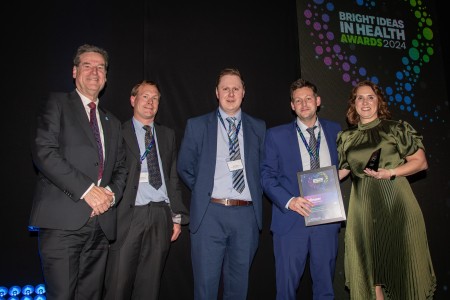Publish date: 29 November 2024
National-first virtual ward and other changes boost lung cancer care for patients

A series of innovations to improve care for lung cancer patients at Northumbria Healthcare NHS Foundation Trust have been recognised with a prestigious award.
The trust’s lung cancer service won the Innovation Champion Award at last week’s (Thursday, 21 November) 2024 Bright Ideas in Health Awards.
The award is recognition for the hard work of the team, which has introduced several developments to support better care. This includes setting up the first lung oncology virtual ward in the country.
The win also comes during Lung Cancer Awareness Month, highlighting improvements to patient care and important prevention measures.
Northumbria Healthcare’s dedicated lung oncology virtual ward brings the benefits of virtual wards to this important cancer pathway.
Virtual wards provide hospital-level care, but where patients are living. This means they may avoid going into hospital or return home more quickly for further treatment following a hospital stay.
Evidence shows that patients have better outcomes when they are in their own homes. Virtual wards are different to existing community services because they are led by a named senior clinician, often a consultant alongside a cancer nurse specialist.
Richard Sterry, the trust’s general manager for respiratory services, said: “We have already seen the huge benefits of using virtual wards in our respiratory services to provide a better experience for patients, but also help reduce pressures on hospital beds. Therefore, we wanted to really improve how we deliver care by delivering the same for our lung oncology pathway.
“Patients both before and after a lung cancer diagnosis may be experiencing a range of emotions and issues related to their health, so the virtual ward can help make them feel more comfortable by receiving care at home. However, they are still receiving hospital-level care, with access to diagnostic tests and other interventions, and can receive psychological support as well.”
An additional benefit brought about by the creation of the lung oncology virtual ward is enhanced support to areas such as the emergency department, inpatient wards and ambulatory care unit at the Northumbria Specialist Emergency Care Hospital (NSECH) in Cramlington.
It means patients can have immediate support if there are concerns about lung cancer during an attendance for another issue. For example, a patient could have a scan of their chest for an injury, but a suspected cancer subsequently be picked up in their lungs during an x-ray or scan. Instead of having to make a GP appointment or wait for a separate hospital outpatient appointment, they can have immediate access to a lung cancer nurse specialist to start the pathway.
Another development introduced by the service at Northumbria Healthcare is daily access for patients on the two-week wait referral cancer pathway so that they can be seen within a few days. This historically was a 12-day wait.
The two-week wait referral system allows a patient with symptoms that may indicate an underlying cancer to be seen as quickly as possible. Equally patients who do not have cancer now find out much sooner.
In practice, this means that most patients will now receive initial contact from the service in a day or two and be booked in for any diagnostic tests or scans that may be necessary, ahead of the first outpatient appointment with a respiratory consultant.
Mr Sterry added: “This change, alongside a range of other service improvement, is about reducing distress for patients and their relatives at what is understandably a difficult time. We recognise that people in these circumstances will be worried and have questions, so the quicker we can resolve those and move ahead with their care and treatment, the better.
“The lung cancer team has embraced a range of opportunities to improve how the lung cancer service is delivered, ensuring that faster access into the service benefit patient outcomes.”
“The daily weekday access means that we try to deliver meaningful progress for patients as early as possible. This reduces the amount of uncertainty and anxiety while they wait and means that those who need treatment have more timely access to the care they need.”
In 2022, Northumbria Healthcare introduced its own screening pilot to detect lung cancer in its early stages. From 420 patients, the team found 18 cancers, 17 of which were in the early stages and able to receive curative treatment.
There were plans to expand the pilot further, but this has now been rolled into the targeted lung health checks programme. For more information, visit www.
Media contact
Ben O’Connell, external communications manager, Northumbria Healthcare
Benjamin.O'Connell@northumbria-healthcare.nhs.ukor
